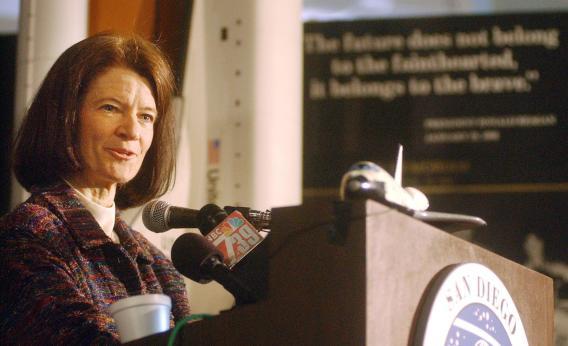Amid the remembrances of Sally Ride, the American astronaut-cum-feminist icon who died yesterday from pancreatic cancer, news surfaced that she had been a lesbian. The obituary published on her science education foundation’s website noted that Ride leaves behind Tam O’Shaughnessy, her partner of 27 years, who previously had been referred to—in classic closet parlance—as a good friend. The New Times of Palm Beach has since confirmed the romantic nature of the relationship with a Sally Ride Science spokeswoman.
In the same article, Ride’s sister, Bear, explained her sibling’s choice to maintain silence surrounding her sexual orientation even though it was something of an open secret among friends and family: “Sally was a profoundly private person. It was just part of who she was. We chalk that up to being Norwegian,” Bear said. “She had a sense of ‘this is family stuff.’”
Bear further elucidated her sister’s position on gay rights:
“That wasn’t her battle of choice—the battle of choice was science education for kids. And I just hope that all the different components of Sally’s life go towards helping kids.”
It goes without saying that Ride was a positive force in the world, and not only because she made it into orbit. Her committed advocacy for science education—especially for girls and young women—in a country that severely lags in that field, deserves the highest praise. But what are we to make of this news that Ride, a powerful role model in so many ways, withheld an aspect of her story that could have been inspiring, even life-saving, for countless others?
In the past decade or so, coming out has rapidly transitioned from a clear risk to an often celebrated move (or, at least, one that inspires indifference). Moreover, as something of a classic, Rockwellian American heroine, Ride’s own identification as homosexual might have been (and indeed, may still be) a more effective catalyst for social conservative reconsideration than the admission of a “liberal elite” actor or “media elite” journalist.
But, forgetting for a moment the weight of the culture at large, what about the age group that Ride was so committed to in her work? What might Ride’s visibility have meant to LGBT youth, to young lesbians, who are all too often crowded off of the media stage by gay men? Gay youths are in desperate need of mentors, and what makes Ride’s reticence all the more disappointing is how clearly gifted she was in that kind of role. To be sure, gay kids can benefit from relationships with mentors who are straight and vice versa, but knowing that you share certain experiences in common can make a world of difference.
As we remember Ride’s well-lived life and celebrate her contributions to exploration and science, we can also regret her silence on this issue. Call it a personal choice or call it a flaw, I’m sad that Ride felt the need, whatever her reasons, to withhold this part of herself.
